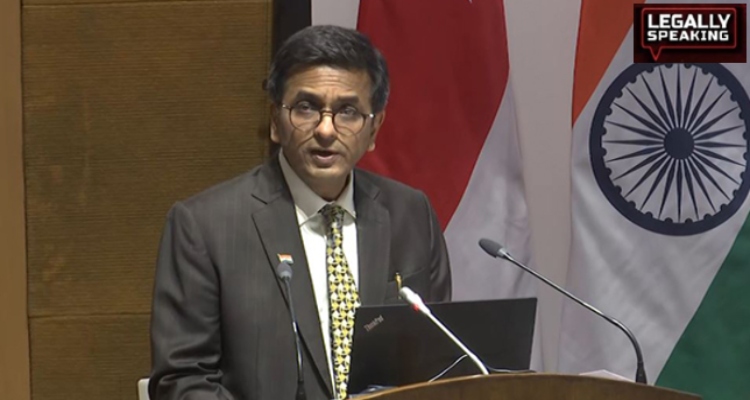
In his keynote speech at the Indo-Singapore Judicial Conference, Chief Justice of India Dhananjaya Yeshwant Chandrachud underscored the pivotal role of technology, especially Artificial Intelligence (AI), in transforming legal research and the judiciary, while highlighting the necessity of ethical considerations in its incorporation.
The CJI commenced his address by praising the conference’s groundbreaking emphasis on technology and its capacity to instigate pivotal dialogues at the nexus of technology and the judiciary. He acknowledged the profound influence of judicial dialogues in fostering cross-cultural exchange and mutual learning among diverse legal systems.
Underlining the deep-seated bonds between India and Singapore, Chandrachud commended both nations for their dedication to upholding the rule of law and advancing access to justice.
“Judicial dialogues indeed play a vital role in fostering cross-cultural exchange and mutual learning among different legal systems. India and Singapore share not only deep social, cultural, and economic ties but also a commitment to upholding the rule of law and promoting access to justice. As two dynamic and rapidly evolving nations, both India and Singapore recognize the transformative potential of technology in modernizing their respective judicial systems,” he stated.
The CJI praised Singapore’s ascent as a global technology and innovation hub, citing its adoption of cutting-edge initiatives such as online dispute resolution platforms and electronic filing systems.
“Singapore has positioned itself as a global hub for technology and innovation. With its strategic location, business-friendly environment, and robust legal framework, Singapore has attracted top talent and investment in the tech sector… Additionally, the Singapore International Commercial Court leverages technology to facilitate international dispute resolution, offering efficient and cost-effective solutions for resolving cross-border commercial disputes,” the CJI remarked further.
He lauded India’s advancements in leveraging technology to modernize its judiciary, particularly through initiatives like the e-Courts project.
“India boasts a vibrant tech ecosystem and a rich legal heritage. With a population of over a billion people and a rapidly growing economy, India presents enormous opportunities in adopting technology within the judicial system. The e-Courts project, for instance, aims to computerize court processes, digitize case records, and establish online case management systems across all levels of the judiciary. By reducing administrative burdens and automating routine tasks, e-Courts enhance the speed and efficiency of legal proceedings, ultimately improving access to justice for all citizens,” Chandrachud stated.
The Chief Justice then shifted his focus to the transformative potential of AI in legal research, describing it as a “game-changer” that empowers legal professionals with unmatched efficiency and accuracy. He elucidated specific instances where AI, notably ChatGPT, had been utilized in court adjudication, citing examples from Colombia and India.
“Additionally, the Supreme Court of India introduced live transcription services, an initiative aimed at enhancing accessibility to legal information. This initiative has been particularly impactful in addressing linguistic diversity, as live transcription services translate judicial proceedings into 18 regional languages and Hindi, ensuring that legal information is accessible to citizens across India using AI termed as the Supreme Court Vidhik Anuvaad Software. This not only saves time and resources but also improves access to justice by reducing delays and backlogs in the court system,” he said.
“In 2023, Justice Juan Manuel Padilla, a Colombian judge, utilized the ChatGPT to deliver a judgment in a case involving insurance claims for an autistic child,” Chandrachud elaborated, underscoring the complementary role of AI in augmenting judicial reasoning rather than supplanting it.
Similarly, he recounted how the Punjab and Haryana High Court in India sought insights from ChatGPT in a bail petition.
However, Chandrachud cautioned against overlooking the ethical, legal, and practical considerations associated with AI integration into court proceedings.
“These instances show that we cannot avoid the question of using AI in court adjudication. The integration of AI in modern processes including court proceedings raises complex ethical, legal, and practical considerations that demand a thorough examination. The use of AI in court adjudication presents both opportunities and challenges that warrant nuanced deliberation,” he asserted.
He noted the importance of transparency, accountability, and fairness in AI utilization, highlighting concerns about potential errors and biases inherent in AI systems.
“The full realization of AI’s potential hinges on global collaboration and cooperation,” Chandrachud said, urging stakeholders to prioritize robust auditing mechanisms and capacity building.
In his concluding remarks, the CJI noted that the advancement of technology and AI is inevitable.
“It holds the potential to significantly change professions and make service delivery more accessible to people. In the field of law, this translates to the potential for AI to expedite and streamline justice delivery. The era of maintaining the status quo is behind us; it is time to embrace evolution within our profession and explore how we can harness the processing power of technology to its fullest within our institutions,” he said.
Aiming to explore the intersection of technology and the legal system, particularly focusing on the transformative role of Artificial Intelligence (AI) in the judiciary, the Supreme Court organized a two-day conference on Technology and Dialogue between the Supreme Courts of India and Singapore on Saturday and Sunday.
Alongside judges, jurists, Chief Justice of Singapore Justice Sundaresh Menon also engaged in panel discussions covering a wide array of topics.




